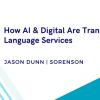In my previous post, I discussed the future of intelligent technologies. In this piece, I share key themes, challenges and opportunities that lie ahead in 2019 for organizations seeking to serve customers better with digital supply chain capabilities.
The Global Perspective
As we continue to operate in a global economy, global trade issues will impact supply chains in 2019. Topping the list is the uncertainty surrounding Brexit. To prepare effectively, organizations are focusing on ways to increase safety stock to minimize the impact of potential cross-border bottlenecks as details for any end-game agreement get ironed out.
At the same time, trade issues elsewhere – like that between the U.S. and China – will continue to put pressure on organizations to prioritize supply chain agility. The winners in 2019 may very well be those organizations that have the flexibility to respond to supply chain change.
The challenges of global climate change will also drive digital supply chain innovation in 2019. Trends include more sustainable products and manufacturing practices, logistics processes that minimize carbon footprint and the ability to comply with environmental regulations.
New Business Models and Roles
Heading into 2019, giants like Amazon and Alibaba are flexing their muscles with unabated ecommerce dominance. Amazon owns almost 50 percent of the ecommerce market in the U.S., while Alibaba sets new records – like sales of 30.8 billion dollars in one day last year.
As if it’s not yet clear, supply chain excellence is now being seen as the way forward for many companies. Some, in fact, are moving to “x-as-a-service” models in business-to-business (B2B) scenarios. Here, the manufacturer not only makes the asset (say, an industrial pump or an HVAC machine), but installs it and manages it with techniques such as predictive maintenance and new ways of monetizing the service provided, such as charging by uptime or units of consumption.
All of this puts the Chief Supply Chain Officer (CSCO) in a new position to deliver greater value to companies seeking to move in such directions. As supply chain management and execution become a differentiator for companies, look for the CSCO – traditionally a back-office role – to come out of the shadows.
Other Challenges
For those of us focused on the evolving digital supply chain in 2019, here are some remaining thoughts on what to keep your eyes open for in the coming year:
- The transportation crunch: The ongoing shift to online retailing will result in a shortage of transportation resources. Already, the U.S. is experiencing a scarcity of about 80,000 truck drivers. Therefore, what we’re seeing is a shift from a “shipper market” to a “carrier market.”
- Competition for natural resources: With the world’s population growing and the availability of natural resources decreasing or at best remaining constant, we have the ultimate supply and demand challenge. We need to design, manufacture, deliver and consume products and assets in a much smarter way, and ultimately, “do more with less.”
- Security concerns: As digital supply chains generate more and more data from smart products, smart assets, social media sentiment analysis and more, data security has come to the forefront. Who owns the data? This is the question for 2019.
- Diversity: Issues of diversity will dominate how organizations approach the global workforce in 2019. Supplier diversity will be a big focus for organizations in 2019.
This wraps up my prognostications for the coming year. While I may fall short on many of the particulars, in the broadest sense it seems quite clear that technology advances will continue to help companies realize their digital supply chain objectives.
Region:






